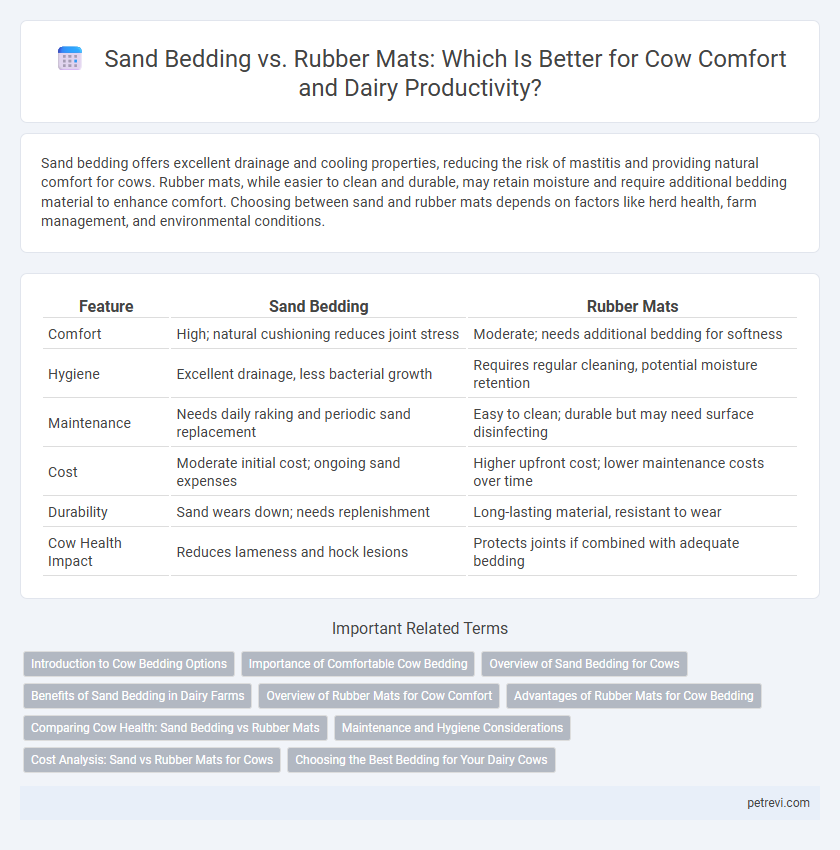Sand bedding offers excellent drainage and cooling properties, reducing the risk of mastitis and providing natural comfort for cows. Rubber mats, while easier to clean and durable, may retain moisture and require additional bedding material to enhance comfort. Choosing between sand and rubber mats depends on factors like herd health, farm management, and environmental conditions.
Table of Comparison
| Feature | Sand Bedding | Rubber Mats |
|---|---|---|
| Comfort | High; natural cushioning reduces joint stress | Moderate; needs additional bedding for softness |
| Hygiene | Excellent drainage, less bacterial growth | Requires regular cleaning, potential moisture retention |
| Maintenance | Needs daily raking and periodic sand replacement | Easy to clean; durable but may need surface disinfecting |
| Cost | Moderate initial cost; ongoing sand expenses | Higher upfront cost; lower maintenance costs over time |
| Durability | Sand wears down; needs replenishment | Long-lasting material, resistant to wear |
| Cow Health Impact | Reduces lameness and hock lesions | Protects joints if combined with adequate bedding |
Introduction to Cow Bedding Options
Sand bedding offers superior comfort and promotes healthy hoof conditions by providing natural drainage and cushioning, leading to reduced lameness in cows. Rubber mats provide a durable and easy-to-clean alternative with consistent support but may require additional bedding to enhance softness and moisture control. Selecting the appropriate cow bedding depends on factors like cow comfort, herd health, maintenance costs, and environmental impact.
Importance of Comfortable Cow Bedding
Comfortable cow bedding significantly impacts dairy cow health, productivity, and welfare by reducing stress and preventing injuries such as hock lesions. Sand bedding offers superior comfort through excellent cushioning and moisture control, promoting natural lying behaviors and improved milk yield. Rubber mats provide durable support and ease of cleaning but may lack the moisture-absorbing properties that contribute to cow comfort and hygiene.
Overview of Sand Bedding for Cows
Sand bedding provides superior comfort and drainage for cows, reducing the risk of mastitis and improving overall udder health. Its inert nature prevents bacterial growth and offers excellent support, promoting better cow hygiene and longevity. Sand also helps keep hooves drier and reduces lameness incidents, enhancing cow welfare on dairy farms.
Benefits of Sand Bedding in Dairy Farms
Sand bedding in dairy farms offers superior cow comfort by providing excellent drainage and temperature regulation, reducing the risk of mastitis and improving overall udder health. Its natural abrasion helps keep cows cleaner and promotes hoof health by minimizing bacterial growth compared to rubber mats. Using sand bedding can enhance cow lying times, leading to increased milk production and better dairy herd productivity.
Overview of Rubber Mats for Cow Comfort
Rubber mats provide superior cushioning and support for cow comfort by reducing joint stress and minimizing injuries compared to harder surfaces. Their non-slip texture enhances stability, promoting better rest and reducing the risk of lameness. These mats also improve hygiene by allowing easier cleaning and reducing moisture accumulation, contributing to overall animal health.
Advantages of Rubber Mats for Cow Bedding
Rubber mats for cow bedding provide superior comfort by reducing pressure on joints and minimizing lameness compared to sand bedding. They offer excellent durability and ease of cleaning, promoting better hygiene and reducing the risk of bacterial infections. Enhanced cow comfort with rubber mats leads to increased lying time and improved overall productivity.
Comparing Cow Health: Sand Bedding vs Rubber Mats
Sand bedding provides superior moisture control and reduces bacterial growth, significantly lowering the risk of mastitis in dairy cows compared to rubber mats. Rubber mats offer cushioning but tend to retain moisture, increasing the likelihood of skin infections and hock lesions. Overall, sand bedding promotes better hoof health and cow comfort, leading to improved productivity and longevity.
Maintenance and Hygiene Considerations
Sand bedding offers excellent drainage and reduces bacterial growth, making it easier to maintain hygienic conditions for cows. Rubber mats provide a softer surface but require frequent cleaning to prevent moisture buildup and bacterial proliferation. Effective maintenance of either bedding type involves regular removal of manure and ensuring proper drying to minimize health risks.
Cost Analysis: Sand vs Rubber Mats for Cows
Sand bedding for cows typically incurs higher initial expenses due to the need for continuous sand replenishment and proper drainage systems, while rubber mats require a significant upfront investment but lower ongoing maintenance costs. Over time, rubber mats can provide cost savings through reduced labor and improved cow comfort, leading to increased milk production and fewer health issues. Analyzing total cost of ownership, including installation, maintenance, and cow productivity, is essential for making an economically sound choice between sand and rubber mat bedding.
Choosing the Best Bedding for Your Dairy Cows
Sand bedding offers superior cow comfort and hoof health by providing excellent drainage and cushioning, reducing the risk of mastitis and lameness in dairy cows. Rubber mats, while easier to clean and install, sometimes lack the necessary filtration and moisture control, potentially leading to increased bacterial growth. Evaluating factors like local climate, stall design, and cow behavior helps determine the optimal choice, with sand typically preferred for maximizing cow welfare and milk production.
Sand Bedding vs Rubber Mats for Cow Bedding Infographic

 petrevi.com
petrevi.com